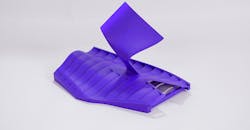3D Systems’ New Material Optimizes F1 Wind-Tunnel Tests
Additive manufacturing group 3D Systems has co-developed a new composite material with the Alpine F1 Team in order to address PIV, or particle image velocimetry, requirements for wind-tunnel testing. The new material, Accura® Composite PIV, makes it possible to 3D-print rigid parts in a high-contrast color, optimized for PIV testing.
Particle image velocimetry is a laser-based method of flow visualization used to obtain velocity measurements and related characteristics of tracer particles embedded in fluids and materials. The Alpine F1 Team has demonstrated that the “reflection mitigating” new material is effective in reducing a common laser-reflection effect, which helps the team gain more insight to the aerodynamic characteristics of the wind tunnel model and contributes to a faster racing car.
The new material is formulated for use with 3D Systems’ stereolithography (SLA) technology – including 3D Sprint® software – for large (up to 1500 mm long), high-resolution parts. From the CAD pattern to the wind tunnel, SLA parts produced using this material take significantly less time to prepare and deliver more accurate, high-resolution data, according to 3D Systems.
One challenge with taking reliable PIV measurements is reflections of laser light from background surfaces, rather than from tracer elements embedded in the SLA material: This reduces image quality and results in a loss of time and useful information.
Using the material, Alpine F1 Team has been able to maximize its wind tunnel investment and improve its understanding of the airflow over cars it is designing.
Printing parts in other currently available materials often requires a multi-step process to achieve a suitable finish required for wind tunnel testing. The color of Accura Composite PIV makes it possible to condense the workflow, for efficiency and throughput gains.
In addition to its color, Accura Composite PIV has a high tensile and flex modulus, with a heat-deflection temperature of 100° C, which optimizes parts to withstand the rigors of wind tunnel testing.
“The deep expertise of (3D Systems) application engineers and their industry-leading solutions have been an invaluable part of our innovation team,” according to Pat Warner, advanced digital manufacturing manager, Alpine F1 Team. “We produce nearly 500 parts per week for wind tunnel testing. Due to the material’s unique optical characteristics, we are now collecting more reliable data from our PIV system in the wind tunnel.”
